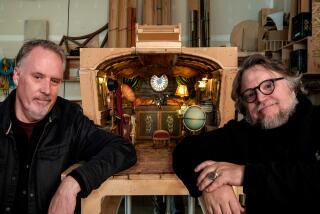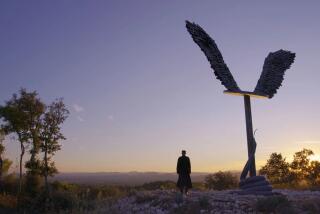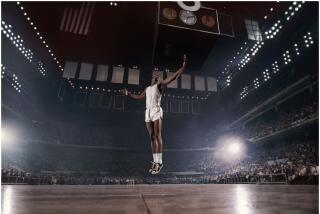William Moritz, 63; Professor, Expert on Experimental Film, Movie Maker
- Share via
William Moritz, a longtime California Institute of the Arts professor who was an authority on abstract animation and the work of experimental filmmaker Oskar Fischinger, has died. He was 63.
Moritz, who lived in Hollywood, died Friday at his sister’s home in the Calaveras County town of Mokelumne Hill after a long battle with cancer.
His death coincided with the publication of “Optical Poetry: The Life and Work of Oskar Fischinger,” his full-length biography on the avant-garde animator and painter who fled Nazi Germany for Hollywood in the 1930s.
Fischinger, who blended color, music, motion and imagery to make “visual music,” was considered one of the most prolific and influential artists of the experimental film movement. He was perhaps best known for his contributions to the “Toccata and Fugue” section of Disney’s “Fantasia,” one of the most experimental films in popular cinema history.
For more than three decades, Moritz worked closely with Fischinger’s widow, Elfriede, and her family to archive the artist’s films and rescue them from obscurity.
“He was a very important force in bringing Fischinger’s reputation to where it is today,” John Canemaker, a film scholar at New York University, said Friday.
Moritz first encountered Fischinger’s work in 1958 when Moritz was a student of film historian Arthur Knight at USC’s School of Cinema.
“It popped all my buttons!” Moritz, recalling his reaction to seeing his first Fischinger film, told Animation World magazine last year
He never met the auteur, who died in 1967, but met his wife a year later. One day she called Moritz to talk about the need to preserve her husband’s nitrate film prints. Moritz, who spoke eight languages, including German, soon won her trust and eventually was helping her archive Fischinger’s work and organizing showings around the world.
He spent years restoring the films not only of Fischinger but of other experimentalists, including Man Ray and Fernand Leger.
Born in Williams, Ariz., Moritz often rode the train to Los Angeles or Phoenix to see operas with his father, a pianist who had emigrated from Germany. He also loved going to the movies to see the cartoon adventures of Mickey Mouse, Donald Duck, Porky Pig and Woody Woodpecker.
After earning a doctorate in comparative literature from USC, where he minored in cinema alongside “Star Wars” filmmaker George Lucas, he taught at various institutions, including Occidental College, Otis Art Institute, Pitzer College, American University Center in Calcutta, India, and UCLA. He began to teach at CalArts in 1987.
Moritz made 44 experimental films himself, including live-action shorts and animation, which were shown at museums in Paris, Tokyo, Stockholm and Amsterdam. His shows were often interactive experiences, said Canemaker, who recalled one performance that included Moritz running through the darkened theater with sparklers. A Los Angeles Times review in 1979 noted that “an aura of sublime gentleness” pervaded his work.
He curated a number of well-received film shows and lectured on animation in Europe and North America. “His grasp of all forms of animation was unique,” said Steve Anker, dean of the School of Film/Video at CalArts, where Moritz was a popular instructor of courses on such topics as the history of experimental film and animation, film grammar and the theory of comedy.
The author of the chapters on animation in the Oxford History of Cinema, Moritz was a past president of the Society for Animation Studies. He received a Lifetime Achievement Award for his contributions to visual music from the Royal Academy of the Netherlands in 1993.
Moritz, who was also a published poet and playwright, is survived by a sister, Mitzi Curtis, of Mokelumne Hill; a brother, Edward, of Fort Wayne, Ind.; four nephews and a niece.
A tribute to Moritz will be held at 7 p.m. tonight at the Egyptian Theater, 6712 Hollywood Blvd. Another program will be held at the Bijou Theater on the CalArts campus in Valencia at 7:30 p.m. Wednesday.
More to Read
Only good movies
Get the Indie Focus newsletter, Mark Olsen's weekly guide to the world of cinema.
You may occasionally receive promotional content from the Los Angeles Times.











